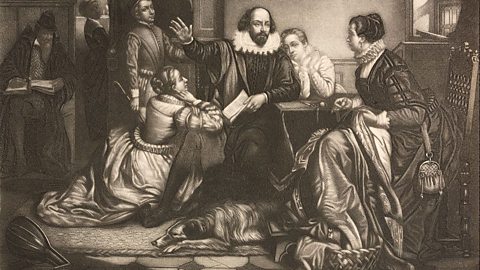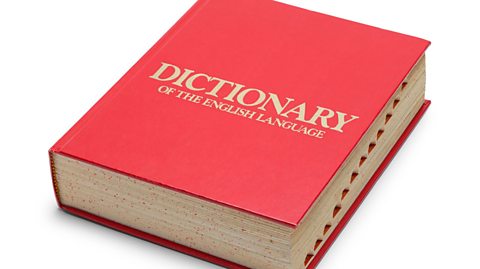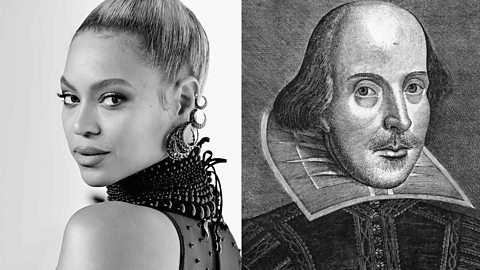Squeezing the finest, most engaging story from your imagination and on to the printed page is perhaps the goal of many authors and playwrights.
During that storytelling process, an author may find that theyāve also unleashed a new word - either one they created themselves or one not widely known beforehand - onto the world.
History has many examples of everyday words which came to us via some very famous writers. “óĻó“«Ć½ Bitesize has got together with the Oxford English Dictionary (OED) to share some examples.
William Shakespeare: Puppy Dog
Even the most celebrated playwrights sometimes need to go a bit gooey-eyed over an adorable wee dog, surely? It may be the reason why Shakespeare is credited with the earliest use of the term āpuppy dogā. He is also acknowledged as creating, or introducing, many other words still used in the English language today.
This example comes from Act 2 Scene 1 of King John, with the line: āTalks as familiarly of roaring lions/As maids of thirteen do of puppy-dogs!ā

Dating from around 1616, itās not the first use of the word āpuppyā, which can be traced back to at least the late 15th Century, but itās thought to be the earliest combination of puppy and dog.
Thanks to Shakespeare, it means fans of David Bowie, Paul McCartney and Dolly Parton can all enjoy songs that contain the phrase puppy dog.
Surely if the Bard were around today, heād be a fan of all three of those artists too?
Charles Dickens: Christmassy
You may have heard the phrase āDickensian Christmasā, to describe a scene that resembles a snowy Victorian street, aglow with festive candlelight and excited chatter. It reflects the festive atmosphere of A Christmas Carol by Charles Dickens, the very man who came up with the adjective Christmassy.
The OED cites Dickensās usage that appeared in the newspaper the Boston Daily Atlas in January 1852, in reference to his time spent in the Turkish city now known as Istanbul: āI have kept Christmas in Constantinopleā¦ endeavoring to persuade myself that it was cold and āChristmassyā (though it wasn't).ā
Dickens's words appearing in an American newspaper demonstrate how popular the author was in the United States, at least for a time. He had toured the USA in the early 1840s. His works were immensely popular and he was celebrated in extravagant ways - the jeweller Tiffanyās even made replica busts of him. However, the relationship soured when Dickens wrote about some aspects of American life which he didnāt enjoy, such as the politics and the constant attention he felt he and his wife were placed under.
The relationship was repaired in Dickensās later life and he returned to America in the late 1860s to give readings that were warmly welcomed. As warm, it would seem, as a Christmassy Christmas in Constantinople.

Jane Austen: Sponge cake
āYou know how interesting the purchase of a sponge-cake is to me.ā
This wasnāt a note from someone offering to sort out a relativeās birthday party, but a sentence in a letter written by the author Jane Austen in 1808. Although it may seem unremarkable, it is seen by the OED as the first recorded use of the term.
It may seem a very āJane Austenā type of thing to settle down with cake and a cuppa to discuss current events, but afternoon tea didnāt arrive in the UK until more than 30 years later.
The cake Austen refers to in her letter is unlikely to be a Victoria sponge either. Queen Victoriaās reign began in 1837 and the traditional treat is thought to have been created early in her reign and aimed at children. The famed author Mrs Beeton named it a Victoria sponge in 1861.
Which leaves us with one burning question. What sort of sponge cake did Jane Austen find interesting?
Like all the best writers, sheās teasing us with a cliffhanger.

John Milton: Pandemonium
The opening ceremony of the London 2012 Olympics featured a section showing the industrialisation of the UK. Huge chimneys sprouted from the floor of the stadium, then a An industrial building or place where molten metal is poured into moulds to create new objects. forged - with a little theatrical trickery - one of the five Olympic rings that rose into the July evening sky.

That section was called Pandemonium, depicting the changes industry brought to the countryside. The word means disorder and confusion, usually on a large scale, and it comes from an author responsible for bringing hundreds of words into the English language, John Milton.
He invented Pandemonium as the name for the capital of Hell in his 1667 epic poem Paradise Lost. Milton is credited with creating 630 words in total in a 2014 book by the lexicographer Paul Dickson.
Milton is also cited by the OED as being the first to use, among others, the words fragrance and terrific. You could certainly use the latter to describe the Pandemonium at London 2012.
This article was published in October 2022.
Five words that have changed their meaning
Why we used to call serious people 'silly' - and other language curiosities.

The big Bitesize spelling and words quiz
Can you wax lexical and get a big score?

